IFLA LAC Regional Division: Libraries and inequality. The role of regional cooperation in building fair and sustainable societies
17 أبريل 2024
Revisit highlights from the Open Session of IFLA’s Latin America and the Caribbean Regional Division Committee (IFLA LAC RDC) during WLIC 2022, Dublin, Ireland, 26 July, 2022.
Libraries and inequality. The role of regional cooperation in building fair and sustainable societies
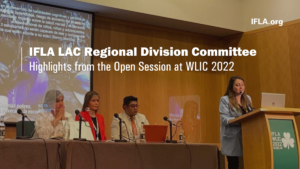
The title of the session was “Libraries and inequality. The role of regional cooperation in building fair and sustainable societies“, since the Covid-19 pandemic has highlighted the development and implementation of multiple theoretical and empirical actions of an informative nature in which the paradigm shift to expand, share and exchange information is a topic of global interest.
The work carried out during and after the Covid-19 pandemic by the libraries of the most socially and financially affected countries, reveals problems that were known but scarcely addressed during this period. Faced with this situation, cooperation between institutions promotes the development of new actions and strategies targeting the most vulnerable sectors.
The purpose of the session was to share an overview of the challenges and opportunities for library and information cooperation in the LAC region. Likewise, this session was designed to promote the implementation of actions aimed at highlighting the benefits that libraries can provide to eradicate inequality and strengthen sustainable development from a regional cooperation perspective, based on the different views and contributions of the region’s stakeholders.
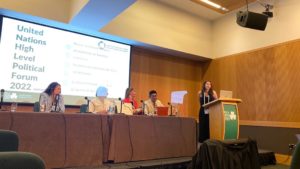
During the session, three speakers shared significant content within the framework of LAC regional cooperation to address the impact of the pandemic.
Key elements of the presentations
The following are some of the key elements of their presentations:
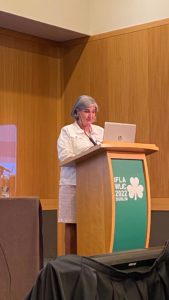 The first speaker was Glória Pérez-Salmerón with a presentation entitled “The role of regional cooperation in building fair and sustainable societies“, in which she addressed the main challenges posed by the pandemic worldwide, and shared some recommendations to mitigate the growing digital gap. In this regard, she focused on a global vision based on a paradigm shift, to determine that libraries serve people and contribute to their sustainable development. She provided a frame of reference about the impact of the pandemic on libraries, the closure of buildings and its consequences, the digital library gaps, the cultural change in public services, and the digital gap regarding the lack of connectivity. In view of this situation, she emphasized the need and relevance of a new library vision to provide services, and to promote and strengthen the implementation of the 2030 Sustainable Development Goals in the societies of the region based on the identification of challenges and strategies to improve understanding and provide solutions to the main inequalities and problems of humanity, mainly based on access to information, which requires social responsibility, trends, innovation and networking in order to state that “libraries are an investment” that requires a transformation after the pandemic in order to position themselves through digital formats, virtual services, user autonomy, information literacy and social impact of services. Finally, she concluded that “Libraries are drivers of social change. Without libraries there is no progress.”
The first speaker was Glória Pérez-Salmerón with a presentation entitled “The role of regional cooperation in building fair and sustainable societies“, in which she addressed the main challenges posed by the pandemic worldwide, and shared some recommendations to mitigate the growing digital gap. In this regard, she focused on a global vision based on a paradigm shift, to determine that libraries serve people and contribute to their sustainable development. She provided a frame of reference about the impact of the pandemic on libraries, the closure of buildings and its consequences, the digital library gaps, the cultural change in public services, and the digital gap regarding the lack of connectivity. In view of this situation, she emphasized the need and relevance of a new library vision to provide services, and to promote and strengthen the implementation of the 2030 Sustainable Development Goals in the societies of the region based on the identification of challenges and strategies to improve understanding and provide solutions to the main inequalities and problems of humanity, mainly based on access to information, which requires social responsibility, trends, innovation and networking in order to state that “libraries are an investment” that requires a transformation after the pandemic in order to position themselves through digital formats, virtual services, user autonomy, information literacy and social impact of services. Finally, she concluded that “Libraries are drivers of social change. Without libraries there is no progress.”
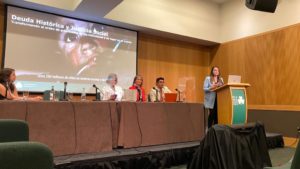 The second speaker was Jeimy Hernandez with a paper entitled: “Historical debt and social justice: changing libraries’ priorities and their place in the world”, in which she addressed the serious conditions of inequality, exclusion and social injustice existing in the LAC region, and provided a historical context linked to the covid-19 pandemic, pointing out that the LAC region was worsened by the pandemic with an impact on poverty and inequality. She also stated that according to several studies, the LAC region and, in particular, the children and youth population —referred to as the “lost population”— was the most affected in their cognitive and educational processes. In addition, she mentioned that the effects of the pandemic were particularly severe for the female child, youth and adult sectors, with an educational, psychological and occupational impact. She also noted that access to information and information technologies in the region is growing, which is reflected in digital reading and reading with the ears. As regards trends and transformations, she mentioned gamification, the Internet of things, mobile learning, open science, hybrid learning and work environments, among others. In this sense, she addressed the library as a pedagogical political project, and pointed out that this space promotes equality, equity and inclusion to support processes as regards content, teaching and learning methods, approaches, structures and strategies; and referred to the “Human Library” project, which is based on people’s experiences. She also emphasized the importance of the “Casa del Pueblo”(People’s House) project in El Salado, Colombia, and how its progress is a sign of library success in strengthening educational aspects.
The second speaker was Jeimy Hernandez with a paper entitled: “Historical debt and social justice: changing libraries’ priorities and their place in the world”, in which she addressed the serious conditions of inequality, exclusion and social injustice existing in the LAC region, and provided a historical context linked to the covid-19 pandemic, pointing out that the LAC region was worsened by the pandemic with an impact on poverty and inequality. She also stated that according to several studies, the LAC region and, in particular, the children and youth population —referred to as the “lost population”— was the most affected in their cognitive and educational processes. In addition, she mentioned that the effects of the pandemic were particularly severe for the female child, youth and adult sectors, with an educational, psychological and occupational impact. She also noted that access to information and information technologies in the region is growing, which is reflected in digital reading and reading with the ears. As regards trends and transformations, she mentioned gamification, the Internet of things, mobile learning, open science, hybrid learning and work environments, among others. In this sense, she addressed the library as a pedagogical political project, and pointed out that this space promotes equality, equity and inclusion to support processes as regards content, teaching and learning methods, approaches, structures and strategies; and referred to the “Human Library” project, which is based on people’s experiences. She also emphasized the importance of the “Casa del Pueblo”(People’s House) project in El Salado, Colombia, and how its progress is a sign of library success in strengthening educational aspects.
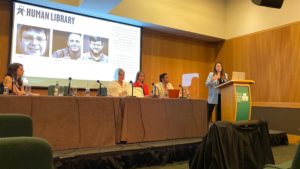
Finally, she highlighted the agenda of priorities to build a fairer and more sustainable region, which is led by CERLALC in order to coordinate policies, reading programs and library systems in the region based on the knowledge, experiences and proposals of the actors and institutions of the sector. She mentioned that this project involves the participation of Coordinators of National Library Networks, the Ibero-American Network of people in charge of reading policies and plans, library associations, professional unions and library communities.
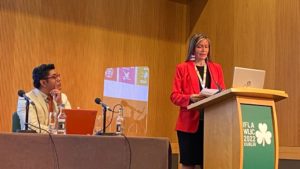 The third presentation was made by Loída García-Febo and was entitled “Library Power: UN Sustainable Development Goals and the promise of a better world“, which is a global approach based on her work at the UN and in other countries around the world. She also focused on some aspects of our LAC region. She addressed many areas within the Sustainable Development Goals where libraries are contributing to a better world that faces multiple challenges related to inclusion, cooperation and collaboration of various social actors, including the strengthening of library and information actions so that societies can enjoy the benefits derived from science and culture. In this sense, she mentioned that there are many inclusive and cooperative actions in the LAC region that will help to build informed, fair and sustainable societies. She stated that various regional actors are gradually positioning themselves in favor of a cooperative transition, since the nature of the region, its cultural diversity, and the vast production of information require the development of environments and cooperative practices for the exchange and reproducibility of information as a factor to counteract unfavorable phenomena. Finally, she emphasized that the SDGs are fundamental to the paradigm shift, since they have a direct impact on information challenges and trends in the LAC region, as in the case of the goal on access to information, which is essential for achieving all the goals, since without information it would be almost impossible to build foundations and solutions.
The third presentation was made by Loída García-Febo and was entitled “Library Power: UN Sustainable Development Goals and the promise of a better world“, which is a global approach based on her work at the UN and in other countries around the world. She also focused on some aspects of our LAC region. She addressed many areas within the Sustainable Development Goals where libraries are contributing to a better world that faces multiple challenges related to inclusion, cooperation and collaboration of various social actors, including the strengthening of library and information actions so that societies can enjoy the benefits derived from science and culture. In this sense, she mentioned that there are many inclusive and cooperative actions in the LAC region that will help to build informed, fair and sustainable societies. She stated that various regional actors are gradually positioning themselves in favor of a cooperative transition, since the nature of the region, its cultural diversity, and the vast production of information require the development of environments and cooperative practices for the exchange and reproducibility of information as a factor to counteract unfavorable phenomena. Finally, she emphasized that the SDGs are fundamental to the paradigm shift, since they have a direct impact on information challenges and trends in the LAC region, as in the case of the goal on access to information, which is essential for achieving all the goals, since without information it would be almost impossible to build foundations and solutions.
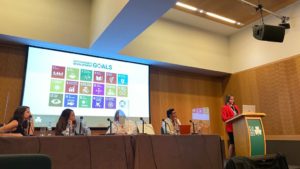
Based on the above, we can conclude that the presentations of the IFLA-LAC Division Open Session were intended to show the development of the dynamic cooperative elements of the region, and in order to enhance their implementation, the collaboration of the actors involved is essential, both the producers of information resources and the actors that implement actions and means of access to these products, such as libraries, since their contributions will have a direct impact on the understanding and progressive building of fair and sustainable Latin American societies, which we can define as those designed to bring about a paradigm shift in which information is intended for society.
Finally, the presentations shared in the open session contribute to the attainment of the current objectives of the IFLA-LAC Regional Division Committee, which —through the cooperation of global and regional library institutions— strengthen the achievement of the SDGs to promote a new vision on the division for the benefit of the communities of the region.